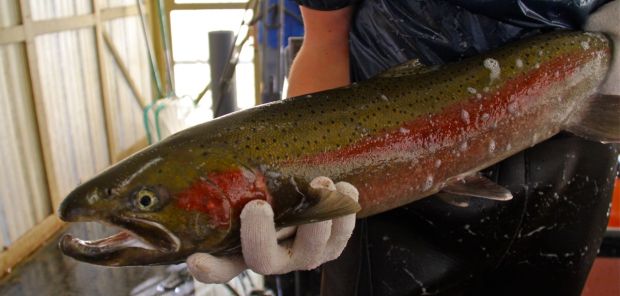forum
library
tutorial
contact

Wild Fish Advocates Threaten
Suit Over Hatcheries
by Rich Landers
Walla Walla Union-Bulletin, January 20, 2016
|
the film forum library tutorial contact |

|
Wild Fish Advocates Threaten
by Rich Landers
|
 SPOKANE -- Funding of chinook, coho and steelhead fish hatchery programs throughout the Columbia River Basin is being challenged by wild fish advocates who contend that hatchery fish adversely affect struggling native fish stocks.
SPOKANE -- Funding of chinook, coho and steelhead fish hatchery programs throughout the Columbia River Basin is being challenged by wild fish advocates who contend that hatchery fish adversely affect struggling native fish stocks.
Last Wednesday, the Wild Fish Conservancy based in Duvall, Wash., issued a 60-day notice of intent to sue the National Marine Fisheries Service and the U.S. Department of Commerce for funding Columbia Basin hatchery programs under the Mitchell Act without complying with provisions of the Endangered Species Act.
Fishing groups are reeling from the announcement, which could lead to significant impacts for Columbia and Snake river salmon and steelhead returns.
Congress approved the Mitchell Act Programs in 1938 to fund hatcheries built to mitigate the impact of dams, logging and pollution on native fish runs.
According to the Wild Fish Conservancy's notice, the act authorized federal support for 62 hatchery programs that now produce about 63 million smolts a year. Costs from 2003 to 2012 ranged from $12 million to $22 million a year.
Mitchell Act Programs are operated by states, tribes and federal agencies. However, some of the Columbia Basin's salmon and steelhead hatcheries are funded by other programs such as those managed by the U.S. Army Corps of Engineers.
Wild Fish Conservancy lawyers say federal funding requires fish managers to assess the effects of releasing hatchery fish, which compete with threatened and endangered wild fish ranging from chinook salmon to bull trout.
The group cites scientific evidence that hatcheries adversely impact wild fisheries.
Representatives with the conservancy couldn't immediately be reached for comment.
Liz Hamilton, Northwest Sportfishing Industry Association executive director, said in a statement, "If (Wild Fish Conservancy) legitimately cared about wild fish recovery in the Columbia River, hatcheries would be the last thing they would be concerned about."
Changing dam operations to spill more water would double the returns of wild spring chinook back to Idaho, potentially taking them off the endangered species lists, she said.
"Instead they attack the hatcheries that were built to mitigate the building of eight federal dams in a system of over 208 dams. The only effect wild fish would notice from (Wild Fish Conservancy) activities in the Columbia would be the loss of tens of millions in funding for conservation and recovery."
Guy Norman, Washington Fish and Wildlife Department regional manager in Vancouver, said, "Mitchell Act hatcheries contribute about 30 percent of the Columbia River fisheries harvest and about a quarter of the ocean harvest for Oregon and Washington."
The potential suit would directly involve the 24 hatchery programs managed by the state Department of Fish and Wildlife as well as coho programs affecting the Clearwater River in Idaho, he said.
"But a suit like this has the potential to set precedent that could affect hatchery facilities managed by the corps, Bonneville Power and so on through the system," said Chris Donley, Fish and Wildlife Department regional fisheries manager in Spokane.
The Wild Fish Conservancy in recent years has filed suits to challenge operations at the Leavenworth National Fish Hatchery as well as state hatchery operations in Western Washington.
State officials reached an agreement with the conservancy in April 2014 that stopped for two and a half years litigation against the Fish and Wildlife Department over its Puget Sound hatchery programs.
The state had to cancel traditional releases of early winter steelhead into most Puget Sound rivers in 2014 and 2015.
The proposed suit for the Columbia Basin could go even further by threatening commercial hatchery fish programs and gillnetting operated by Indian tribes.
"It is unlikely that the Basin's Tribal, recreational, and commercial fisheries could be maintained without support from the Mitchell Act and its hatcheries," state and federal agencies say in a Mitchell Act fact sheet.
Part of the problem is the bottleneck of hatchery program permit applications that must be approved by the understaffed National Oceanic and Atmospheric Administration offices, fish managers say.
"Plans have been developed for several years to address threats associated with wild fish and hatchery fish interactions as well as with broodstock collection and monitoring," Norman said. "We're trying to actively implement them."
He said the state agency will be consulting with other hatchery program operators and federal agencies as well as working with attorneys on how to respond to the potential lawsuit.
"It's too soon to speculate on potential outcomes," he said.
Sara Thompson, speaking for the Columbia River Inter-Tribal Fish Commission, said in a statement, "Carefully managed hatcheries play a critical role in Columbia Basin salmon recovery by rebuilding salmon populations while supporting fisheries.
"Lawsuits like this one could hurt salmon recovery efforts and distract us from the bigger picture of working together to reform hatchery practices."
And it could lead to a huge impact on fishermen, Donley said.
learn more on topics covered in the film
see the video
read the script
learn the songs
discussion forum
